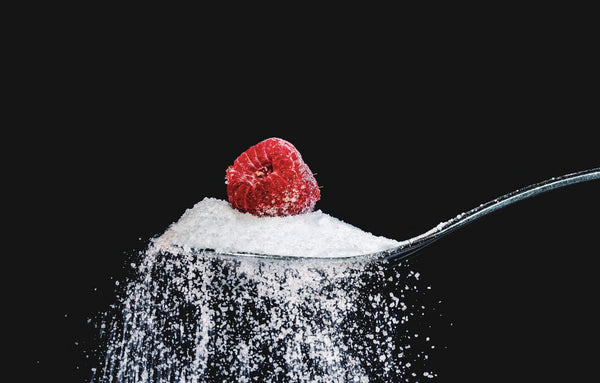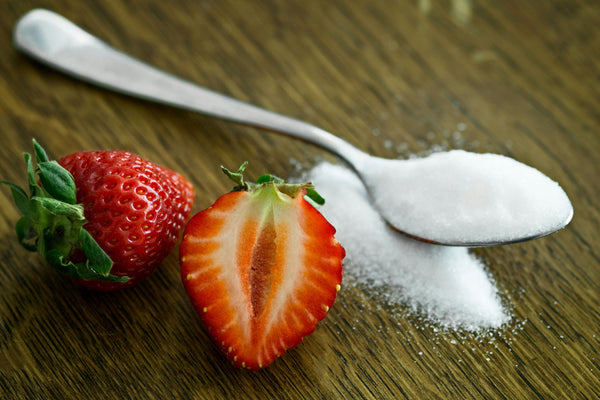With the growing concern over sugar consumption, many people are turning to artificial sweeteners as a healthier alternative. Two popular options on the market are erythritol and stevia. Both sweeteners are commonly used in sugar-free products and have gained popularity among those looking to reduce their sugar intake.
In short, erythritol has 0.2 calories per gram and is ~70% as sweet as sugar. Stevia has zero calories and can be up to 300 times as sweet as sugar. Let's take a closer look at erythritol and stevia to determine which sweetener may be the better choice for you.
What is Erythritol?
Erythritol is a sugar alcohol that is commonly used as a sugar substitute in food and beverage. It is about 70% the level of sweetness of sugar and is a low-calorie sweetener that is considered safe for consumption by the FDA. While certain fruits and fermented foods naturally contain erythritol, the majority of erythritol on the market is produced through a fermentation process using yeast.
It is known to provide sweetness without significantly impacting blood sugar levels, making it an attractive option for individuals managing diabetes or adhering to low-carb diets. Unlike some other sugar alcohols, such as sorbitol or xylitol, erythritol is generally well-tolerated and is less likely to cause digestive side effects like bloating or diarrhea. Moreover, with approximately 0.2 calories per gram and a glycemic index (GI) of 0, erythritol is favored by those seeking to reduce calorie intake or manage their weight.
Despite its popularity as a sugar substitute, there is controversy surrounding the safety of using erythritol. Recent research findings have highlighted a correlation between elevated erythritol levels and specific health concerns. It's worth noting, though, that these studies focused on measuring serum levels of erythritol rather than analyzing the consumption of erythritol as a sweetening agent. Further investigation is imperative to fully comprehend erythritol intake's potential implications for health.
What is Stevia?
Stevia is a natural sweetener derived from the stevia plant, scientifically known as stevia rebaudiana. The sweetness of stevia comes from the leaves of the stevia plant, which contain compounds called steviol glycosides. These compounds are much sweeter than sugar (250-300 times), but without the calories or negative effects on blood sugar levels. South America has been using stevia for centuries as a sweetening agent and for its medicinal properties.
The stevia leaf can be used fresh, dried, or in powdered form to sweeten beverages, baked goods, and other foods. Stevia is also used in many commercial products as a natural sugar substitute. Due to its zero-calorie content and its ability to lower blood sugar levels, stevia has gained popularity as a healthier alternative to sugar in recent years. However, some individuals may perceive a slight aftertaste or bitterness, particularly in higher concentrations or specific preparations.
Which Sweetener is Better Than the Other?

When it comes to comparing erythritol and stevia, determining which sugar substitute is superior largely depends on individual preferences and health goals. Both sweeteners offer distinct characteristics and health benefits, making them suitable choices for various dietary needs and preferences.
For Blood Sugar Management
Erythritol stands out as an excellent option for blood sugar management due to its minimal impact on blood glucose levels. With a glycemic index of 0 and the ability to provide sweetness without causing spikes in blood sugar, erythritol is often favored by individuals with diabetes or those aiming to maintain stable blood sugar levels.
Stevia shares similar benefits in terms of blood sugar management. As a non-nutritive sweetener, stevia does not add calories or carbohydrates to a diet and has no effect on blood glucose levels. This makes it a suitable choice for individuals seeking to control their blood sugar levels without compromising on sweetness.
For Weight Management
Both erythritol and stevia offer advantages for weight management due to their low-calorie nature. Erythritol, with roughly 0.2 calories per gram, can be beneficial for individuals looking to reduce overall calorie intake without sacrificing sweetness in their diet. Its ability to provide sweetness without adding significant calories makes it a valuable tool for weight management strategies.
Similarly, stevia is a calorie-free sweetener that can aid in weight management efforts. By providing intense sweetness without contributing any calories, stevia allows individuals to enjoy sweet-tasting foods and beverages without the added energy content. This can be particularly beneficial for those aiming to control calorie intake and manage their weight.
Potential Side Effects
While both erythritol and stevia are generally considered safe for consumption, they may still cause side effects in some individuals, albeit rarely. Erythritol, despite being well-tolerated by most people, can lead to gastrointestinal symptoms such as bloating, gas, or diarrhea when consumed in large amounts. However, these side effects are typically mild and tend to diminish with continued use.
Similarly, stevia may cause minor side effects such as gastrointestinal discomfort or a slight aftertaste, especially in higher concentrations. Some individuals may also experience allergic reactions to stevia, although such occurrences are uncommon.
Overall, both sweeteners are regarded as safe for most people when consumed in moderation, but individuals with sensitivities or allergies should exercise caution and consult with a healthcare professional if necessary.
Other Natural Sweeteners to Consider

Monk Fruit
Monk fruit is known for being up to 200 times sweeter than sugar, making it a great option for those looking to cut back on their sugar intake while still satisfying their sweet tooth. Monk fruit also has no impact on blood sugar levels, making it compatible with diabetics or those watching their glycemic index. When comparing monk fruit vs. stevia, another popular natural sweetener, the main difference lies in taste. While stevia can sometimes have a bitter aftertaste, monk fruit is known for its mild and pleasant flavor, making it a favorite among those looking for a more natural alternative to sugar.
Allulose
Allulose is a low-calorie natural sweetener, with roughly 0.4 calories per gram, that is gaining popularity as an alternative to traditional sugar. Unlike stevia, which is derived from the stevia plant, allulose is a simple sugar that is naturally found in small quantities in fruits like figs and raisins. Allulose has a similar taste and texture to sugar, making it suitable for those looking to reduce their sugar intake. Additionally, allulose has been shown to have minimal effects on blood sugar levels, making it a suitable option for diabetics or those looking to manage their weight. However, allulose is not as well-researched as stevia, monk fruit, and erythritol.
Bottom Line: Erythritol vs. Stevia
When comparing erythritol and stevia, the decision on which is better ultimately comes down to personal preferences. Erythritol contains negligible calories and is about 70% the sweetness of sugar, while stevia leaf extract is much sweeter than sugar and has no calories. Both can be a suitable alternative for those looking for a natural sweetener and compatible with a low-carb or keto diet. Ultimately, the choice between erythritol and stevia depends on personal taste and dietary preferences.